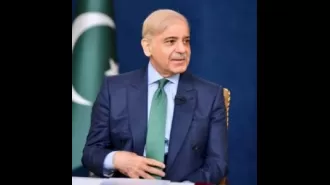Hamas wants changes to Gaza ceasefire plan, US considering their response.
Hamas responded to the US-backed ceasefire proposal for Gaza and requested some changes.
June 12th 2024.

Hamas announced yesterday that they have submitted their response to the US-backed proposal for a ceasefire in Gaza, but with some desired changes. This comes after the United States has been pushing for an outright acceptance, but negotiations are still ongoing for a solution to the eight-month war.
The foreign ministries of Qatar and Egypt, who have been working alongside the United States as mediators, have confirmed that they have received Hamas' response and are currently reviewing it. White House national security spokesman John Kirby stated that they are evaluating the response and are in receipt of it. Hamas spokesman Jihad Taha mentioned that their response includes amendments that confirm the ceasefire, withdrawal, reconstruction, and exchange, but did not provide further details.
However, while supporting the general outline of the deal, Hamas officials have expressed concerns about Israel's commitment to implementing its terms, especially the provision for a permanent end to fighting and a full Israeli withdrawal from Gaza in exchange for the release of all hostages held by the militants. Despite the US claiming that Israel has accepted the proposal, Israeli Prime Minister Benjamin Netanyahu has given conflicting signals, stating that they will not stop until Hamas is completely destroyed.
US Secretary of State Antony Blinken has been in the region this week, making it his eighth visit since Hamas' attack on southern Israel last October, which sparked the current conflict in Gaza. He has continued to pressure Hamas to accept the proposal, stating that the UN Security Council's vote in favor of it shows that the world supports the plan. Blinken also mentioned that Netanyahu confirmed his commitment to the proposal during their meeting on Monday.
In a joint statement, Hamas and the smaller Islamic Jihad militant group announced that they are ready to deal positively to reach an agreement and that their priority is to bring a complete stop to the war. A senior Hamas official, Osama Hamdan, stated that the group has submitted their remarks on the proposal to the mediators. The proposal has raised hopes for an end to the eight-month conflict that has resulted in the deaths of over 37,000 Palestinians and displacement of 80% of the population.
In a separate development, the UN human rights office has stated that both Israeli forces and Palestinian militants may have committed war crimes during the Israeli raid that rescued four hostages over the weekend. At least 274 Palestinians were killed in the operation, according to Gaza's Health Ministry. Blinken, who was in Cairo on Monday, also visited Jordan where he announced over $400 million in additional aid for Palestinians in Gaza and the wider region.
The US has been pushing for a three-phased plan, with the first phase consisting of an initial six-week ceasefire and the release of some hostages in exchange for Palestinian prisoners. Israel would withdraw from populated areas and allow civilians to return to their homes. The proposal also calls for humanitarian aid to be distributed throughout Gaza and for negotiations to begin for a permanent end to hostilities and the release of all remaining hostages. However, conflicting signals from Netanyahu have caused uncertainty about the transition from the first to the second phase, with concerns about the ceasefire being prolonged indefinitely and hostages remaining in captivity.
In conclusion, negotiations are ongoing for a solution to the ongoing conflict in Gaza, with Hamas submitting their response to the US-backed proposal with desired amendments. The United States continues to pressure Hamas to accept the proposal, with the hope that it will bring an immediate ceasefire and lead to negotiations for a lasting solution. Meanwhile, concerns about Israel's commitment and conflicting signals from Israeli Prime Minister Netanyahu have caused uncertainty about the next steps in the process.
The foreign ministries of Qatar and Egypt, who have been working alongside the United States as mediators, have confirmed that they have received Hamas' response and are currently reviewing it. White House national security spokesman John Kirby stated that they are evaluating the response and are in receipt of it. Hamas spokesman Jihad Taha mentioned that their response includes amendments that confirm the ceasefire, withdrawal, reconstruction, and exchange, but did not provide further details.
However, while supporting the general outline of the deal, Hamas officials have expressed concerns about Israel's commitment to implementing its terms, especially the provision for a permanent end to fighting and a full Israeli withdrawal from Gaza in exchange for the release of all hostages held by the militants. Despite the US claiming that Israel has accepted the proposal, Israeli Prime Minister Benjamin Netanyahu has given conflicting signals, stating that they will not stop until Hamas is completely destroyed.
US Secretary of State Antony Blinken has been in the region this week, making it his eighth visit since Hamas' attack on southern Israel last October, which sparked the current conflict in Gaza. He has continued to pressure Hamas to accept the proposal, stating that the UN Security Council's vote in favor of it shows that the world supports the plan. Blinken also mentioned that Netanyahu confirmed his commitment to the proposal during their meeting on Monday.
In a joint statement, Hamas and the smaller Islamic Jihad militant group announced that they are ready to deal positively to reach an agreement and that their priority is to bring a complete stop to the war. A senior Hamas official, Osama Hamdan, stated that the group has submitted their remarks on the proposal to the mediators. The proposal has raised hopes for an end to the eight-month conflict that has resulted in the deaths of over 37,000 Palestinians and displacement of 80% of the population.
In a separate development, the UN human rights office has stated that both Israeli forces and Palestinian militants may have committed war crimes during the Israeli raid that rescued four hostages over the weekend. At least 274 Palestinians were killed in the operation, according to Gaza's Health Ministry. Blinken, who was in Cairo on Monday, also visited Jordan where he announced over $400 million in additional aid for Palestinians in Gaza and the wider region.
The US has been pushing for a three-phased plan, with the first phase consisting of an initial six-week ceasefire and the release of some hostages in exchange for Palestinian prisoners. Israel would withdraw from populated areas and allow civilians to return to their homes. The proposal also calls for humanitarian aid to be distributed throughout Gaza and for negotiations to begin for a permanent end to hostilities and the release of all remaining hostages. However, conflicting signals from Netanyahu have caused uncertainty about the transition from the first to the second phase, with concerns about the ceasefire being prolonged indefinitely and hostages remaining in captivity.
In conclusion, negotiations are ongoing for a solution to the ongoing conflict in Gaza, with Hamas submitting their response to the US-backed proposal with desired amendments. The United States continues to pressure Hamas to accept the proposal, with the hope that it will bring an immediate ceasefire and lead to negotiations for a lasting solution. Meanwhile, concerns about Israel's commitment and conflicting signals from Israeli Prime Minister Netanyahu have caused uncertainty about the next steps in the process.
[This article has been trending online recently and has been generated with AI. Your feed is customized.]
[Generative AI is experimental.]
0
0
Submit Comment





